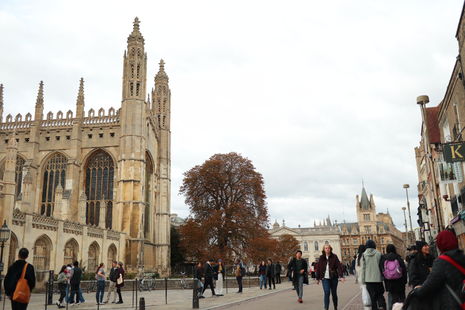On overcoming the freshers’ curse
Abril Duarte González tells freshers to remember that Cambridge is the least interesting thing about them

With Michaelmas creeping along, I feel a responsibility to warn freshers: the biggest danger you’ll face at Cambridge lies in your own expectations.
All through my first year, I passed judgments on Cambridge – both as an idea and as a lived reality – turning people into characters and anecdotes into evidence. I don’t remember much of Michaelmas. Most of it slipped by in my room, working through endless reading lists and counting down the days until I could go home. I do remember the third week, when we were assigned Weber’s Protestant Ethic. It felt like the end of the world. I reread sentences over and over, agonisingly trying to piece them together, while everyone else seemed to glide through the term effortlessly. By Bridgemas, photos of formals were everywhere – people dressed up, already in neat cliques – and I couldn’t understand how they were balancing it all. This carried into Lent. I did well enough in mocks to stay afloat, but by the start of Easter I was disillusioned.
“The real question is: who were you before Cambridge, and who will you be after it?”
Cambridge had been my dream for years, yet I felt like I was doing the whole thing wrong. Was it a matter of choosing one or the other – grades, friends, societies, time at home, time in the library? Some of my peers lived for Sunday nights at Kiki’s, others for Union campaigns or sports. Everyone seemed to be chasing something. It didn’t matter what – VKs, votes, or positive supervisor comments – because the reward was the same: validation. I couldn’t shake the sense that I was missing something, that I wasn’t doing Cambridge the way I was ‘supposed’ to. But the truth is, there isn’t one way to do it.
That’s the freshers’ curse: believing there’s one correct way to be here, and that failing to live up to it means you’ve failed altogether.
By Easter, things shifted. Older years had promised it would be the best term – the garden parties, punting, May Balls. They meant it. Once exams were over, the city shifted into a few weeks of pure pleasure. I found joy in quieter things, too. Walking around town, reading for pleasure (for once), enjoying my own company. May Week was gentle, short, just enough to rekindle a love for Cambridge: for the city itself, for the supervisors we no longer saw, for friends we could finally catch up with again. I’d made it through the year, and for the first time, it felt like progress.
“The freshers’ curse convinces you that Cambridge should complete you”
I don’t think it’s really about imposter syndrome. Academically, Cambridge is hard but (mainly) manageable. Socially, it can be brutal. The danger is forgetting who you are outside of it – outside the gowns and punts, matriculation and May Week, outside the perfect postcard image. Cambridge is not the sum of your late teens or early twenties, and it certainly isn’t the measure of your worth. Attaching your value to an institution, a city, a culture that cannot love you back is a losing game. Yes, you worked hard to get here, but so did everyone else. And that doesn’t make you better or worse. The real question is: who were you before Cambridge, and who will you be after it?
That’s why Easter mattered to me. Not because it was perfect, but because it brought an odd kind of comfort. After the storm of the year, it felt calm. I wasn’t the most social, and I spent too much time worrying about the ‘what ifs’ – what if I’d chosen another uni, another college, made more of an effort. But the gratification comes in the balancing act: uncertainty alongside intensity, challenge alongside growth. That’s what I’ll take away from my first year – not the superficial proof of an Oxbridge life, but the gentler reward of doing meaningful work, both academic or otherwise.
My goal this year is to manage my expectations, my tunnel vision, my FOMO. And I’d encourage freshers to do the same. Because behind the Bridgemas photos, the pres to Revs, the glossy LinkedIn updates, most people are struggling in one way or another. Appearances matter here, as they do anywhere, but in Cambridge they’re sharpened by niches and secret elites, pinky rings and monogrammed puffers. The freshers’ curse convinces you that Cambridge should complete you. The truth is, it can’t, and it won’t. And that’s okay.
 News / Colleges charge different rents for the same Castle Street accommodation2 March 2026
News / Colleges charge different rents for the same Castle Street accommodation2 March 2026 News / News in Brief: waterworks, wine woes, and workplace wins 1 March 2026
News / News in Brief: waterworks, wine woes, and workplace wins 1 March 2026 News / Climate activists protest for ‘ethical careers policy’1 March 2026
News / Climate activists protest for ‘ethical careers policy’1 March 2026 News / Angela Merkel among Cambridge honorary degree nominees27 February 2026
News / Angela Merkel among Cambridge honorary degree nominees27 February 2026 News / Private school teacher who lied about Cambridge degree barred from teaching27 February 2026
News / Private school teacher who lied about Cambridge degree barred from teaching27 February 2026









